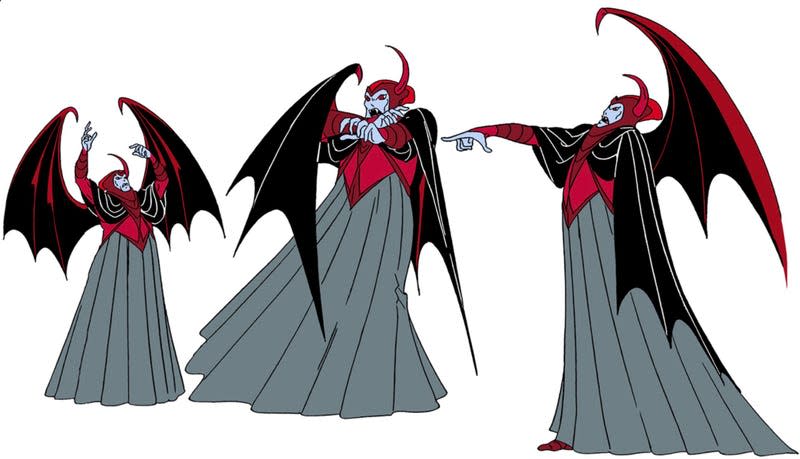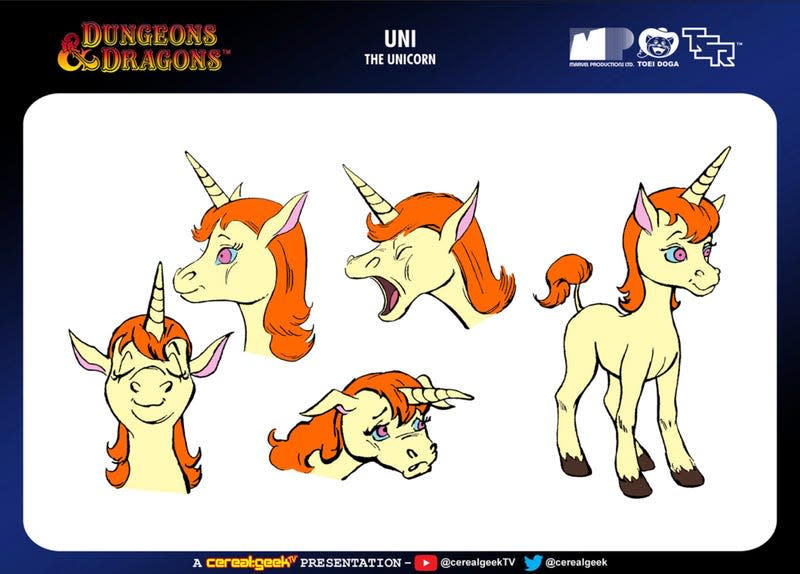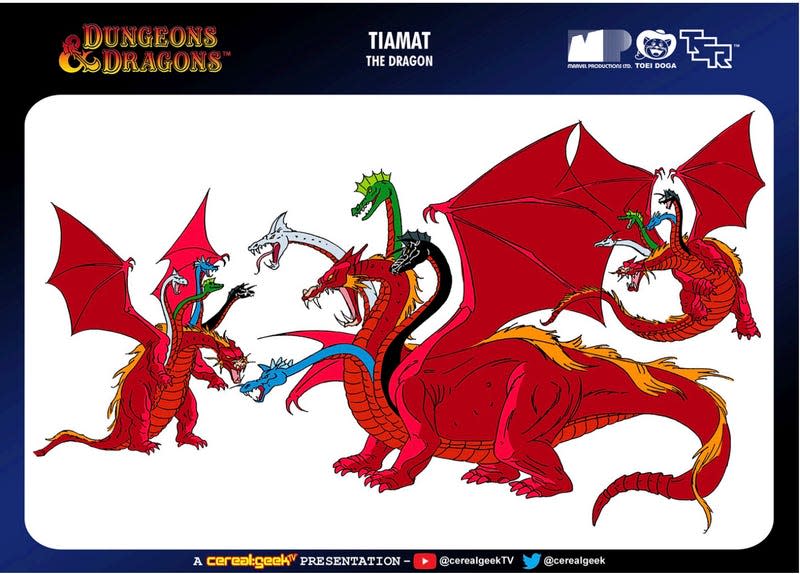How the Finale of the Dungeons & Dragons '80s Cartoon Became a Pop-Culture Mystery

- Oops!Something went wrong.Please try again later.
Hasbro’s multitude of celebrations marking the 50th anniversary of Dungeons & Dragons include streaming the fan-favorite 1980s D&D cartoon on the 24/7 Dungeons & Dragons: Adventures FAST channel. The animated series, despite a relatively short run of three seasons and 27 episodes, has become a fantasy genre classic. The engaging storytelling and dark themes greatly influenced future media—and the characters were so memorable, 40 years later they caused a social media frenzy when their live-action counterparts made an unexpected cameo in Dungeons & Dragons: Honor Among Thieves.
For the uninitiated, back in 1983 Dungeons & Dragons designer and co-creator Gary Gygax had the bright idea to quash the Satanic Panic brewing around his game with the cunning use of… a Saturday morning kids’ TV show. In doing so he also unintentionally helped create one of the most unsanitized children’s programs in history—tackling mature topics like trauma, the futility of revenge, and what to do when your 11-year-old-brother contemplates slaughtering the demon-man that haunts your every waking moment?
In collaboration with Marvel Productions, TSR, and the Japanese company Toei, developer and writer Mark Evaniar and his team (including Hank Saroyan and later Michael Reaves) were tasked with diluting complicated D&D mythology and gameplay into 30-minute episodic TV for preteens. This genius marketing ploy to make RPGs more relatable also produced a loyal and slightly unhinged multi-generational fanbase—one that fueled a decades-long rumor about the last episode they thought they had seen: “Requiem.”
Nostalgia tends to make it increasingly difficult to separate reality from rumor, and a false collective memory began about what happened “to” and “in” that final episode. In an interview with io9, Mark Evanier said he wishes to dispel the urban legend once and for all: “There was NO ‘final episode’ of Dungeons & Dragons.”
Confused yet? You soon will be.
First and foremost, let’s establish what is remembered correctly: how the show began. Evanier was clever enough to invent a camera-friendly cast of characters to demonstrate player tactics (now a gaming standard) with five all-American kids, aged 9 to 15: Hank the Ranger, Eric the Cavalier, Sheila the Thief, Presto the Magician, Bobby the Barbarian child, and Diana the Acrobat (their one Black friend).

Voiced by a then star-studded cast of ‘80s sitcom actors—including Don Most, Adam Rich, and Willie Aames—the series kicked off in spectacular fashion with a carnival roller-coaster ride gone rogue. The pilot begins with the kids finding themselves sucked through a cosmic portal into a magical realm, where they encounter a little man with a kinky moniker, “The Dungeon Master.” Each immediately gains a special skill and game-like weaponry to confront challenges (sound familiar yet?), explained in plot exposition that fits neatly into the opening title sequence. There was also Uni, a mute infant unicorn, suitable for children ages 8 and up.
Evanier intended to play fanservice throughout the show by including some of the game’s villains: Tiamat the red-hydra dragon, and the Spider Queen, Lolth. However, the true scene-stealer was new: Venger (voiced by Optimus Prime himself, Peter Cullen), a demon of pure nightmare fuel sporting a dramatic floor-length cloak of the finest haberdashery. What we didn’t know at the time is that he also had an origin story for the ages (spoiler alert); it eventually revealed the angry dragon was his sister, and the wise old sage, the Dungeon Master, their daddy.
While these plot twists were impressive, the imagined versions by the fandom were equally theatrical. They emerged during the internet’s infancy and spanned the early days of social media, from ‘90s chat rooms to Facebook and Reddit. According to the comments on this Reactor thread: “But I remember watching the ending... which doesn’t exist!” a user named Cap-mjb posted. “They end up back reunited with their families.”
Another user, Capnjimbo the BBS Captain, disagreed, insisting “It ended on a cliffhanger.” On Reddit, OGBranFlakes lamented “They never got home… Does this mean we can get a D&D movie with Venger?” On Facebook, MrSchee fondly called this “My first brush with the Mandela Effect,” and recalled how he was so sure he “saw an episode that revealed they were actually all dead (and in hell).”
As it turns out, the reason for the Mandela Effect—the name for a false memory that is nonetheless shared by a large group of people—in this case was relatively simple: there were two last episodes. The last one to actually air was “The Winds of Darkness,” a story with the usual fare: a terrifying creature called the Darkling must be defeated, and there was also fog. It ends with Dungeon Master gaslighting the children once more, with tales of yet another way home.
On the other hand, “Requiem”—a never-produced script written by Reaves that was intended as a possible series finale—reveals Venger’s identity as the Dungeon Master reopens the portal (wait, he could’ve done that the whole time?!) for the gang to choose whether to stay or go before fading to black. We never learn their decision. Before his passing in 2020, Reaves posted the PDF on his now-defunct blog, leading to a fan-made version of the episode created from editing together existing footage. Now, that’s intense dedication: being so invested in the cartoon’s outcome, fans first created a shared memory, then they created their own finale. Evanier believes the “missing finale” adds nicely to the lore, proving the power of the show’s legacy. In the current climate of malicious fanboys boycotting any new or updated IP, it’s heartwarming to see geek culture using its powers for good, albeit obsessively.

Over email, George Krstic, VP of the D&D franchise team for Wizards of the Coast, told io9 that the “unaired final episode isn’t really part of the official D&D cartoon canon.” But, he added, “We are all fans of it (the cartoon) here,” and “the entire series means a lot to many players (and myself as well). It continues to be popular on the D&D: Adventures FAST [channel], so we know that there is hunger for more.” As for confirming the newest online rumor: Venger still might appear in the live-action Paramount+ series or get his own standalone cartoon. “We want to be open to those paths,” Krstic wrote.
Another sign that the D&D cartoon characters continue to be popular came when they popped up (in live-action!) in the TTRPG’s recent big-screen outing. In an interview with Polygon, Honor Among Thieves co-writer and co-director John Francis Daley said the filmmaking team easily acquired the rights to use the animated characters’ likenesses, since they were already part of the TSR property picked up by Wizards of the Coast. “The rights are kind of baked into the movie, just because it’s D&D,” he explained.
At a recent San Diego Comic-Con, Evanier watched the now-famous cameo for the first time as young ranger and thief cosplayers sat in the audience. “It was so great seeing those kids again,” he mused. As far as what he thinks happened after the portal reopened: “Oh, the kids are still trapped in that world along with Venger, Tiamat, and all my royalties!”
Want more io9 news? Check out when to expect the latest Marvel, Star Wars, and Star Trek releases, what’s next for the DC Universe on film and TV, and everything you need to know about the future of Doctor Who.
